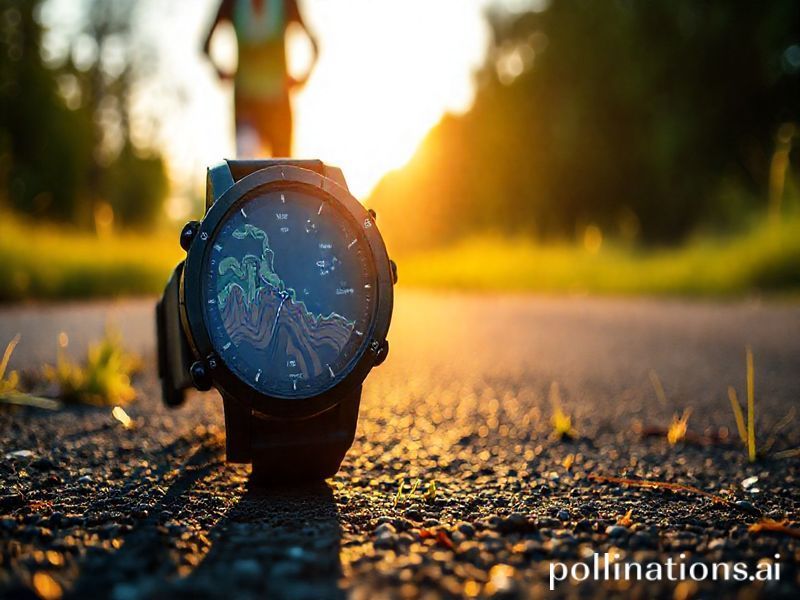garmin fenix 8 pro microled
Geneva, Switzerland — While diplomats at the Palais des Nations were busy drafting strongly-worded press releases about climate, trade, and whatever crisis will trend next week, a far more consequential summit was taking place three tram stops away. Inside a pop-up showroom that smelled faintly of espresso and existential dread, Garmin unveiled the Fenix 8 Pro MicroLED—a wrist-mounted panopticon that promises to outlast both its wearer and, if the marketing copy is to be believed, the concept of linear time.
“Adventure has a new benchmark,” the press kit proclaimed, which is corporate speak for “we’ve strapped a minor deity to your radius.” The new MicroLED display is brighter than a hedge-fund intern’s future and sips power the way a Swiss banker sips 1945 Macallan—slowly, deliberately, and with the knowledge that scarcity is the ultimate luxury. In practical terms, the watch will run for 48 days in expedition mode, or roughly the time it takes the United Nations to agree on a lunch order.
Global Implications: Because Even Your Pulse Has Geopolitics
Garmin may be headquartered in Olathe, Kansas—where the biggest elevation gain is the parking garage—but the Fenix 8 Pro arrives at a moment when every heartbeat is data, and every datum is a commodity. Chinese factories etched the sapphire lens, South Korean fabs grew the MicroLED substrate, and a Dutch yacht broker was first in line to pre-order a dozen because, well, someone has to keep track of deckhand cardio while circling Mykonos. The watch’s multi-band GNSS supports every satellite constellation short of Elon Musk’s mood swings, ensuring your trail run in Patagonia is logged with the same authoritarian precision Beijing applies to its social-credit ledger.
Meanwhile, humanitarian NGOs are eyeing the device like a donor-wallet in the shape of a bezel. Picture the press release: “Our field surgeons now triage refugees using the Fenix 8 Pro’s pulse-ox sensor, calibrated against Geneva Convention standards.” The irony, of course, is that the same sensor can also tell a tech-bro in Palo Alto when his cold-plunge was sub-optimal. One device, two realities—proof that late-stage capitalism can multitask almost as well as the watch itself.
The Existential Dashboard
Beyond brawn, the Fenix 8 Pro offers an emotion tracker—yes, really—that translates heart-rate variability into tidy bar graphs of angst. Garmin’s engineers insist this is for “wellness,” but anyone who has sat through a European Central Bank press conference knows that quantifying despair only makes it tax-deductible. Imagine a Somali pirate captain checking his stress levels before boarding a tanker, or a Bolivian lithium miner glancing at his wrist to confirm—surprise!—his cortisol is, indeed, stratospheric. The watch doesn’t alleviate suffering; it simply logs it in beautiful 2,000-nit clarity.
Battery Anxiety as Foreign Policy
Forty-eight days of endurance sounds utopian until you realize the planet may not last that long. Garmin’s product managers, clad in recycled-polyester fleeces, insist the Fenix 8 Pro is “carbon-aware,” which is akin to calling a landmine “soil-aware.” Still, the marketing team gamely notes that every watch ships in packaging made from algae—because nothing says “eco-hero” like wrapping a $1,400 gadget in pond scum. Somewhere, a Pacific island nation already plotting its climate-reparations invoice is adding this bullet point to the spreadsheet.
Conclusion: The Wrist Is the Final Frontier
The Fenix 8 Pro MicroLED isn’t just a fitness watch; it’s a pocket-sized allegory for our age. It tracks altitude while the oceans rise, measures VO2 max as democracies flatline, and counts steps toward an exit that doesn’t exist. You can map every mountain, but not the moral high ground. And yet, we queue—online, in Dubai malls, on Japanese drop-ship apps—for the privilege of strapping tomorrow’s obituary to our wrists. Because if the world is ending, we might as well know our split times.







